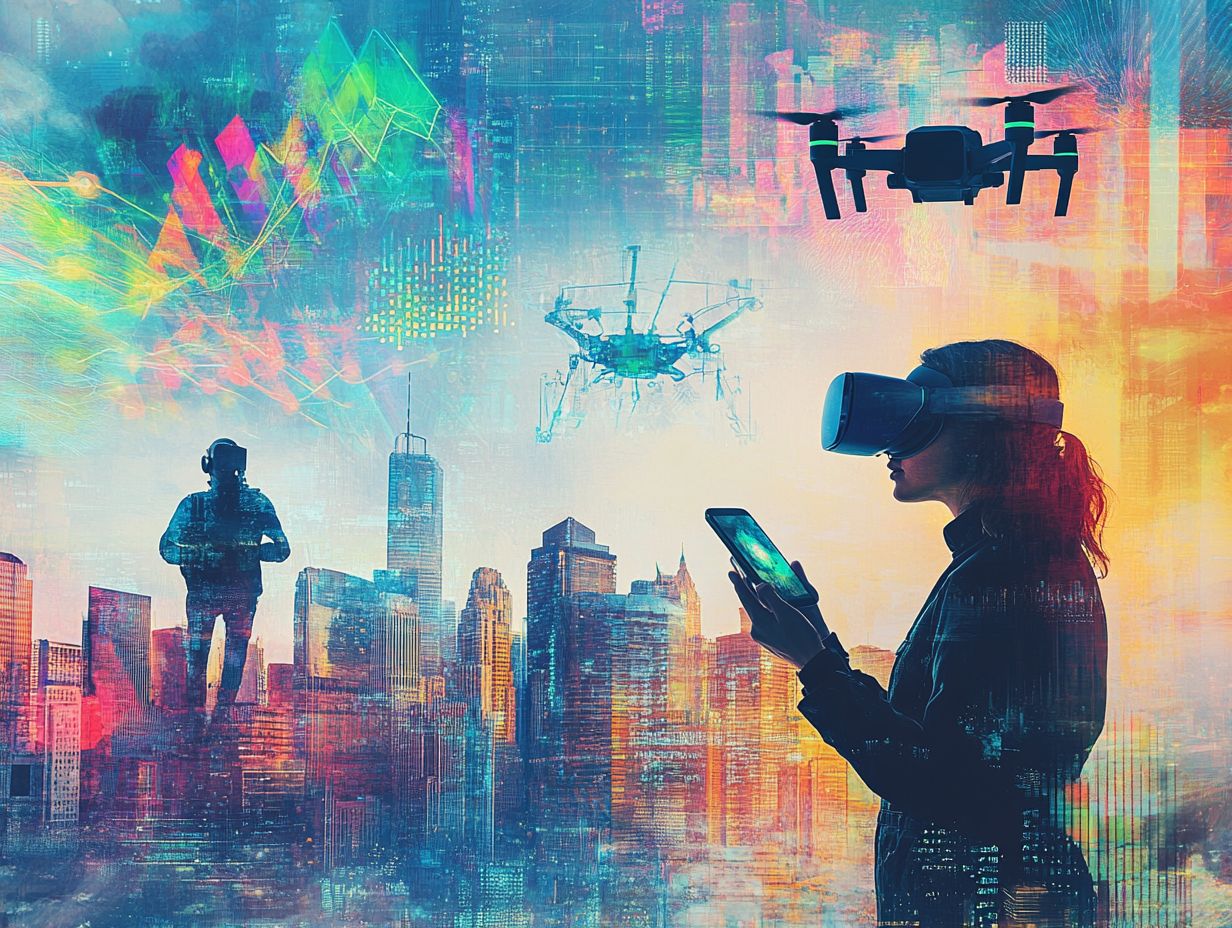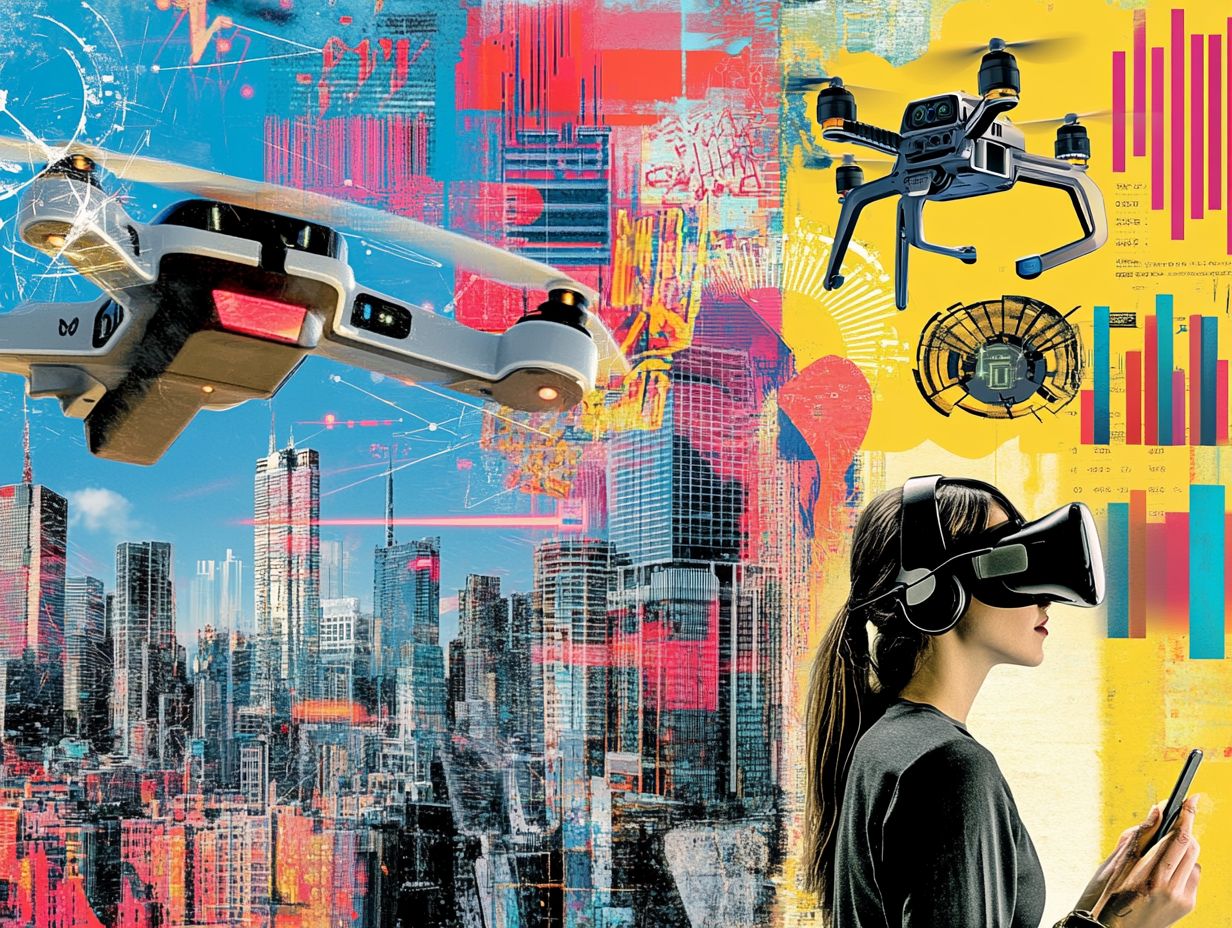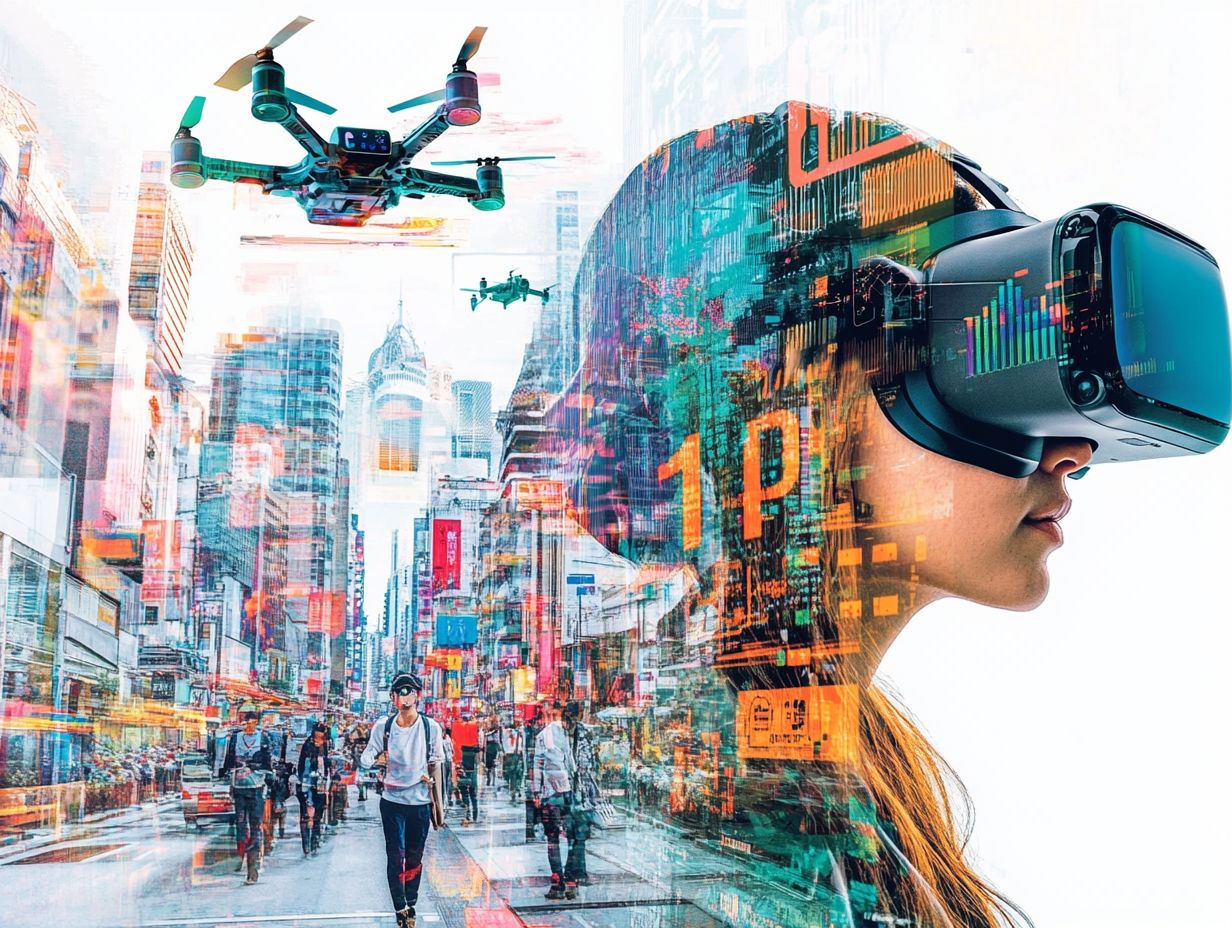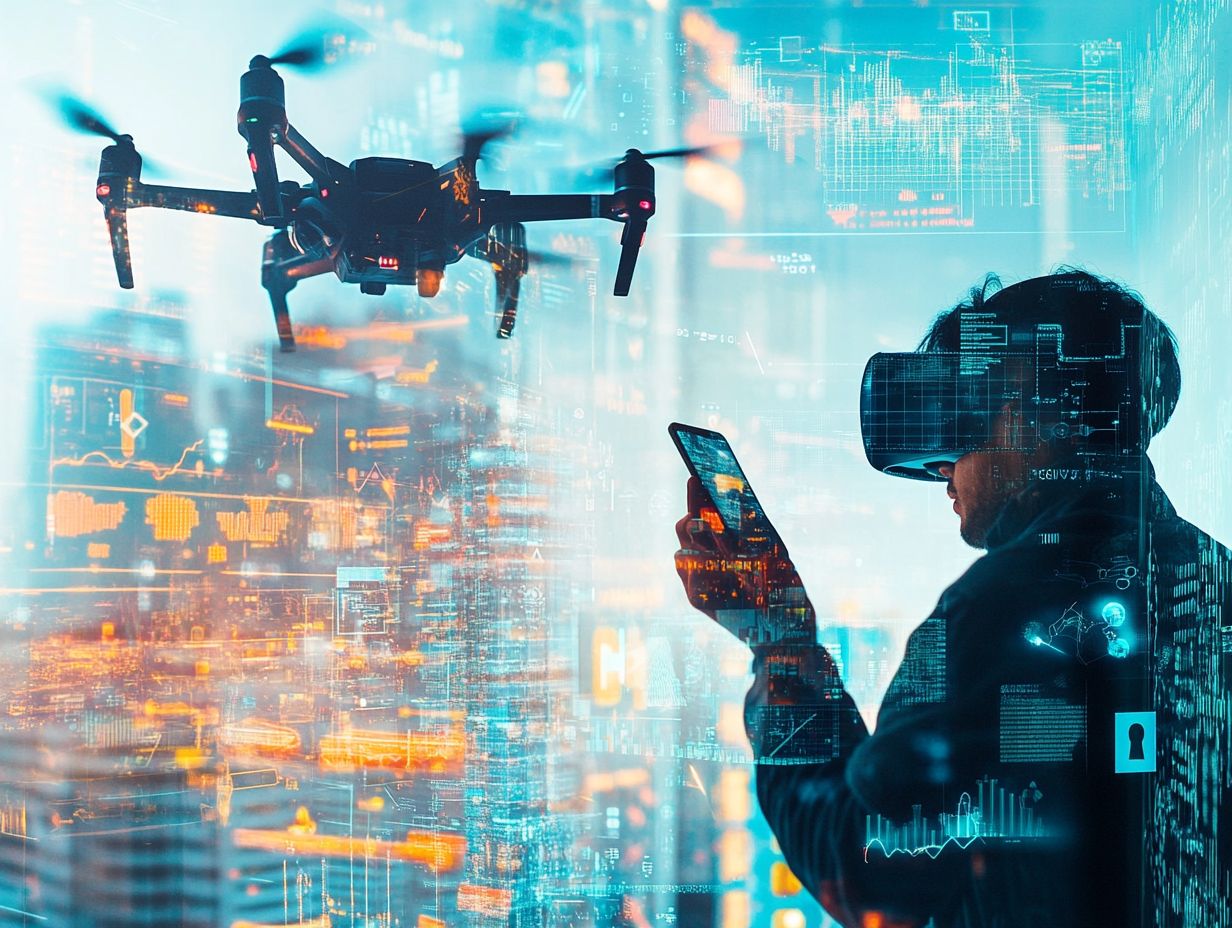5 Emerging Market Trends in Technology
In today s fast-paced digital landscape, emerging technologies are transforming the way you live and work.
From the increasing integration of advanced technology into your daily routines to the proliferation of connected devices, these trends are sending waves through various industries.
As you navigate these changes, important questions will surface regarding the benefits, risks, and ethical implications at play.
This article delves into five key trends in technology, illuminating their impact and providing insights to help you maneuver through this dynamic environment.
Contents
- Key Takeaways:
- 1. Artificial Intelligence (AI) Is Becoming More Prevalent in Everyday Life
- 2. The Rise of Internet of Things (IoT) Devices
- 3. Increased Focus on Cybersecurity
- 4. Virtual and Augmented Reality (VR/AR) Technologies Are Gaining Traction
- 5. Expansion of Cloud Computing Services
- How Do These Trends Affect Businesses and Consumers?
- Frequently Asked Questions
Key Takeaways:

- AI is revolutionizing daily life, from virtual assistants to self-driving cars. Businesses must adapt to stay competitive.
- The IoT is rapidly expanding, connecting devices and creating new opportunities for businesses to collect and analyze data.
- Cybersecurity is top of mind for both businesses and consumers as they navigate the potential risks and benefits of technology.
1. Artificial Intelligence (AI) Is Becoming More Prevalent in Everyday Life
Artificial Intelligence (AI) is swiftly becoming a pivotal element in your everyday life, shaping everything from personal assistants like Siri and Alexa to cutting-edge generative AI applications.
These applications elevate creative processes, drive digital transformation, and enhance customer experiences across sectors such as healthcare, finance, and education.
With its remarkable ability to analyze data through predictive analytics the ability to use data to predict future trends AI is revolutionizing business operations. It makes them more efficient and responsive to market fluctuations.
Its adaptability allows for a multitude of applications, such as customizing marketing strategies to align with your individual preferences and streamlining supply chain management.
AI is also revolutionizing patient care through predictive diagnostic tools, creating personalized experiences that truly resonate.
You are increasingly encountering AI-driven recommendations and services tailored to your unique behaviors and needs, all while navigating a landscape that is rapidly evolving thanks to these intelligent advancements.
2. The Rise of Internet of Things (IoT) Devices
The rise of Internet of Things (IoT) devices marks a significant transformation toward a more interconnected world. Imagine everyday objects, equipped with sensors and seamlessly linked to the internet, effortlessly collecting and exchanging data.
This integration of IoT into your home and workplace not only enhances your experience but also optimizes processes, driving automation, compliance, and efficiency.
IoT devices take on many forms, from smart thermostats and wearable fitness trackers that cater to your personal lifestyle to advanced industrial sensors that monitor machinery.
In your home, these devices can learn your preferences, adjust settings in real-time, and even anticipate maintenance needs, elevating both comfort and convenience.
On the business front, enterprises harness IoT applications to gather extensive amounts of data, empowering well-considered choices and minimizing operational delays.
This encourages a proactive approach to customer service. The connectivity offered by IoT not only enriches your daily life but also revolutionizes business operations, paving the way for a more efficient future.
3. Increased Focus on Cybersecurity
Technology is changing quickly. You need to sharpen your focus on cybersecurity as it becomes a top priority for businesses and consumers.
Organizations are investing in ways to handle risks and tools that help them follow rules to protect their digital assets.
As digital transformation speeds up, it’s vital to do more than just protect data. You also need to foster a culture of security awareness among employees.
A strong plan for dealing with breaches, regular risk checks, and ongoing training for staff will boost your defense.
These tools will automate compliance and simplify following changing cybersecurity rules. By adopting these practices, you can create a secure framework that protects your current tech and prepares you for future challenges.
4. Virtual and Augmented Reality (VR/AR) Technologies Are Gaining Traction

Virtual and Augmented Reality (VR/AR) technologies are rapidly transforming how you interact with digital content. These technologies offer immersive internet experiences that seamlessly blend the physical and digital realms.
In industries like gaming, education, and retail, VR and AR are enhancing customer experience and engagement through innovative applications.
As you explore the vast potential of VR and AR, you’ll discover new ways to use these tools for realistic simulations and environments. For instance, students can virtually journey through historical events or conduct intricate science experiments all without stepping outside the classroom.
In retail, AR helps you visualize products in your own space before making a purchase, making the buying process easier and more engaging. Generative AI amplifies these interactions by personalizing content and fostering deeper connections between you and the digital world around you.
This powerful synergy of technologies is captivating and is opening doors to more effective training, marketing, and storytelling methods across various sectors. Now is the time to embrace these technologies to stay ahead of the curve!
5. Expansion of Cloud Computing Services
The expansion of cloud computing services is transforming the technology landscape. It offers you scalable and flexible solutions that promote automation compliance and support sustainable technology initiatives.
As you increasingly embrace the cloud, you’ll discover the exciting potential of quantum computing to elevate your capabilities.
This shift streamlines your operations and reduces overhead costs. It also gives you the power to adapt effortlessly to changing demands and market conditions.
By leveraging the cloud, you can deploy resources efficiently and pay only for what you actually use, leading to significant savings.
Cloud computing also supports sustainability goals by minimizing your carbon footprint through resource optimization and lessening the need for on-premises infrastructure. As quantum computing continues to advance, it promises to revolutionize data processing and analytics within the cloud, unlocking new realms of efficiency and problem-solving potential for your organization.
How Do These Trends Affect Businesses and Consumers?
The ongoing technology trends and digital transformation are affecting you as a consumer and shaping the nature of business operations. These developments are not only redefining customer experience and operational efficiency across various sectors but also highlight trends influencing tech stocks in 2024.
When you engage with businesses that integrate AI and financial technology into their operations, you’re likely to find them better equipped to meet your evolving expectations. This, in turn, fosters innovation.
These advancements are changing how you interact with brands. You can now expect experiences that feel increasingly personalized and streamlined.
Companies using AI can analyze large amounts of data quickly to uncover insights into your preferences. This allows them to tailor their services and products to better suit your needs.
Concurrently, financial technology is revolutionizing transactions, making them faster and more secure. This ultimately boosts your trust in these services.
Together, these trends boost your customer satisfaction and help businesses adapt quickly. This agility is vital for their growth and sustainability in an ever-competitive landscape.
What Are the Potential Benefits and Risks of These Trends?
The potential benefits of emerging technology trends for you include better efficiency, an enhanced customer experience, and the promotion of sustainable technology practices. To navigate these changes effectively, it’s important to stay informed about 5 major market trends following global events. Yet, you must also be wary of significant challenges, such as cybersecurity threats and data privacy issues that affect both businesses and consumers.
As you embrace automation tools and AI-driven processes, you can optimize workflows. This reduces turnaround times and minimizes human error.
This transformation not only streamlines your operations but also paves the way for a more responsive customer service model. Here, personalized interactions cultivate loyalty and satisfaction.
With your growing reliance on data, the associated cybersecurity threats become increasingly pronounced. It’s essential for you to prioritize strong security measures.
Ignoring these vulnerabilities can lead to severe financial losses and a decline in consumer trust. This underscores the delicate balance you must maintain between innovation and risk management in this ever-evolving digital landscape.
How Can Businesses Stay Ahead of These Emerging Technologies?

To stay ahead of emerging technologies, you must adopt proactive strategies. These should encompass robust risk management practices, automation compliance, and a commitment to continuous learning.
This adaptability is essential in a landscape characterized by rapid technological and market shifts.
By cultivating a culture of innovation and creating an environment that encourages experimentation, you can explore new ideas and technologies without the fear of failure. This approach gives you the power to identify potential threats and seize new opportunities that advancements in technology may present.
It’s equally important for you as a leader to invest in workforce training. Ensuring that your employees possess the skills necessary to effectively utilize these emerging tools is crucial.
Aligning your compliance measures with evolving regulations will not only mitigate risks but also instill confidence in your customers. This ultimately enhances your organization s competitive edge.
What Are the Ethical Implications of These Technologies?
The ethical implications of emerging technologies, like AI and blockchain, are crucial for consideration. They shape data privacy, accountability, and the future of work across various industries.
As these technologies become more prevalent, they present a range of ethical dilemmas that society must navigate. Concerns about how personal data is collected, stored, and utilized are paramount. You might worry about the potential misuse of sensitive information and questions about individual consent and the transparency of data transactions.
Accountability also emerges as a significant issue. When automated systems make decisions impacting people’s lives, it raises important challenges. The shift toward automation brings risks of job displacement across various sectors and exacerbates socio-economic disparities.
Thus, a thoughtful examination of these dimensions is essential for cultivating a technological landscape that remains equitable and respects individual rights.
How Will These Trends Shape the Future of Technology?
The convergence of technology trends is set to profoundly influence the future of your organization. This will drive digital transformation, enhance IoT integration, and expand the capabilities of machine intelligence across various sectors, including the emerging trends in financial technology.
As you navigate this rapidly evolving landscape, you’ll discover innovative applications that streamline operations and create entirely new markets. For example, integrating advanced analytics with IoT devices could lead to intelligent supply chains that respond in real-time, anticipating demands and minimizing waste.
The rise of artificial intelligence will usher in an era of automated decision-making. This means using technology to make decisions without human input, fostering a culture of agility and responsiveness. By embracing these shifts, you can position yourself at the forefront of groundbreaking developments in fields such as healthcare, finance, and renewable energy. Ultimately, this could reimagine traditional business models and unlock immense growth potential.
What Are Some Challenges That May Arise with These Trends?
While advancements in technology trends offer numerous advantages, challenges like cyber resilience, adapting to digital transformation, and maintaining regulatory compliance can impede progress for both businesses and consumers. Staying informed about market trends in the energy sector can help navigate these challenges effectively.
These hurdles often arise from the complexities of implementing new technologies in a rapidly evolving digital landscape. Regulations can vary greatly across regions. For many organizations, the fear of non-compliance stifles innovation as stakeholders wrestle with ambiguous legal frameworks.
The rise of sophisticated cyber threats demands robust cybersecurity measures. This often requires significant investments in both technology and training. To navigate these challenges effectively, prioritize developing comprehensive compliance strategies and enhance your cybersecurity posture through regular audits, staff education, and collaboration with regulatory bodies.
This approach ensures a more secure and compliant technological environment for your organization.
Frequently Asked Questions

What are the 5 emerging market trends in technology?
The 5 emerging market trends in technology include artificial intelligence, blockchain, virtual and augmented reality, Internet of Things, and edge computing.
What is artificial intelligence?
Artificial intelligence, or AI, simulates human thinking. This includes processes like learning, reasoning, and self-correction.
What is blockchain?
Blockchain is a decentralized digital ledger technology. It enables secure and transparent recording of transactions between parties without a central authority.
What are virtual and augmented reality?
Virtual and augmented reality are immersive technologies. They create a simulated or enhanced experience for users through computer-generated content.
What is the Internet of Things?
The Internet of Things, or IoT, connects devices and objects through the internet. This allows them to collect and exchange data without human intervention.
What is Edge Computing?
Edge computing is a way to process data closer to where it’s actually needed. This setup reduces delays and makes data handling more efficient.
Imagine getting data processed right where you need it, without the wait! Edge computing makes this possible, speeding up your operations and enhancing performance.






